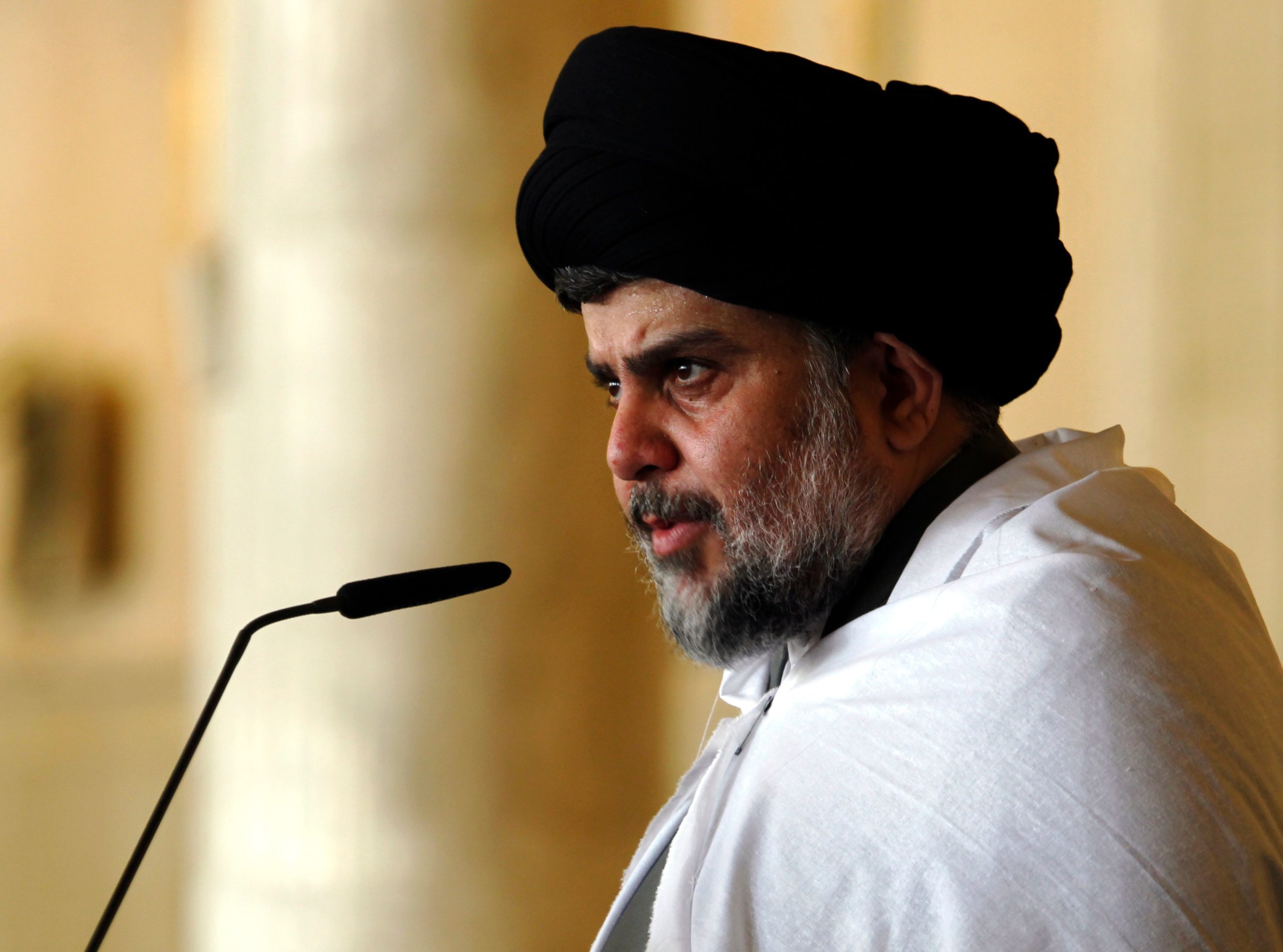
Iraqi Turmoil and American Folly
The unrest in the wake of Muqtada al-Sadr’s resignation reminds us of the limits of American intervention.
Muqtada al-Sadr at the grand mosque of Kufa in the holy city of Najaf, on April 3, 2015. (Haidar Hamdani / AFP via Getty Images)
Iraq almost descended into civil war last week after an influential cleric, Muqtada al-Sadr, withdrew from politics, having failed to secure a power-sharing deal with rival Shiite factions. The move prompted his supporters to storm the Green Zone, and at least 30 died and hundreds were wounded in the clashes that followed. Western authorities warned that the situation threatened the very survival of the Iraqi state, though a fragile calm has now been restored.
It is a shame that the American hawks who advocated for the 2003 invasion are too busy with other matters: many pushing escalation against Russia over Ukraine or, in the case of George W. Bush, teaching a Masterclass on leadership (yes, really).
The byzantine details behind the latest Iraqi unrest are almost beside the point, except insofar as they present an object lesson in the dangers of unintended consequences. Americans remember Sadr, if at all, as the leader of the Mahdi Army, which pitched ferocious battles against the U.S.-led occupation in the immediate wake of the Iraq War. Since then, he has emerged as an opponent of Tehran’s domination of Iraq.
That posture has naturally made Sadr a darling of the region’s Saudi-led Sunni bloc, with Riyadh-aligned outlets gushing over the cleric and his resistance against Persian hegemony. Arab News writer Baria Alamuddin, for example, insists that “this is not a struggle about religious authority, but a war for the survival of Iraq as an independent and sovereign nation, in which Sunnis, Kurds, liberals, and various minorities all have an equal stake.”
I’m not so sure. Sadr’s political life has long been bound up with the Shiite state next door, as evidenced by the fact that he spent the better part of a decade in Iran after the Americans routed his Mahdi uprising. Sadr’s own spiritual leader, Grand Ayatollah Kadhim al-Haeri, has long been based in Iran’s holy city of Qom.
Indeed, part of the reason for Sadr’s resignation was Haeri’s decision to step down and urge his followers to pledge bay’ah (allegiance) to Iranian Supreme Leader Ayatollah Ali Khamenei. Sadr claims the Iranians coerced Haeri into resigning. That may or may not be true. Either way, the whole thing smells a lot like an intra-Shiite feud, not some nationalist battle royal pitting “bad” pro-Iran Shiites against “good” Shiites allied with Sunnis, Kurds, and liberals (what liberals, Ms. Alamuddin?!).
It was precisely such simplistic moralizing that set the stage for the 2003 invasion in the first place: the belief, downright hilarious in retrospect, that Iraq is a coherent national state and a democracy awaiting liberation—rather than a hodge-podge of factions forced to live together by the border-drawing whims of Western imperialists a century earlier. Of course, Iraq was bound to be torn apart by regional powers attached to various ethnic and sectarian blocs, with the Iranians likely to come out victorious thanks to the Shiites’ sheer numerical advantage.
The ultimate result is that the Iraq War ended up empowering Tehran—a terrible outcome according to the hawks’ own anti-Iran logic.
All of this raises what should be a discomfiting question: What sorts of unintended consequences are poised to unfold from the uniparty hawks’ determination to wage a long proxy war against Russia in Ukraine? Already, Western sanctions that were supposed to collapse Russia’s economy and lead to a palace coup against Vladimir Putin have instead buoyed the ruble to historic highs.
More than that, the sanctions impelled many in the developing world to look to the emerging BRICS formation (Brazil, Russia, India, China and South Africa) as an alternative to an American-led global financial system, where your currency reserves aren’t safe from the ideological commitments of Foggy Bottom hawks and wokesters (but I repeat myself). Europeans, meanwhile, are looking ahead to a freezing winter as the combination of the sanctions and their own green follies leave the Continent struggling to fuel industries and households alike.
There are still more terrifying prospects. One I fear isn’t getting nearly enough attention is the possibility of renewed conflict in the Balkans, as pro-Russian populations in places like Serbia feel increasingly squeezed out of the European system, while Western-aligned ones press every advantage in long-simmering disputes over language, identity, and history.
Times like ours call for fair-minded diplomacy and strategic caution. That’s too much to ask of those in Washington who pushed Iraq to the brink—and who still occupy the commanding heights of our teetering empire.
Dear readers: I’m back from my book sabbatical. Look for this column every Tuesday, and tune in toward the end of every week when I join Emile, Helen, and Micah for the TAC Right Now podcast. Thanks for bearing with me.
ADVERTISEMENT
ABOUT THE AUTHOR
Sohrab Ahmari
Sohrab Ahmari is a founder and editor of Compact magazine, a contributing editor of The American Conservative, and a visiting fellow of the Veritas Center for Ethics in Public Life at Franciscan University. His books include From Fire, by Water: My Journey to the Catholic Faith (Ignatius, 2019) and The Unbroken Thread: Discovering the Wisdom of Tradition in an Age of Chaos (Convergent/Random House, 2021). He is currently writing a book about privatized tyranny in America.